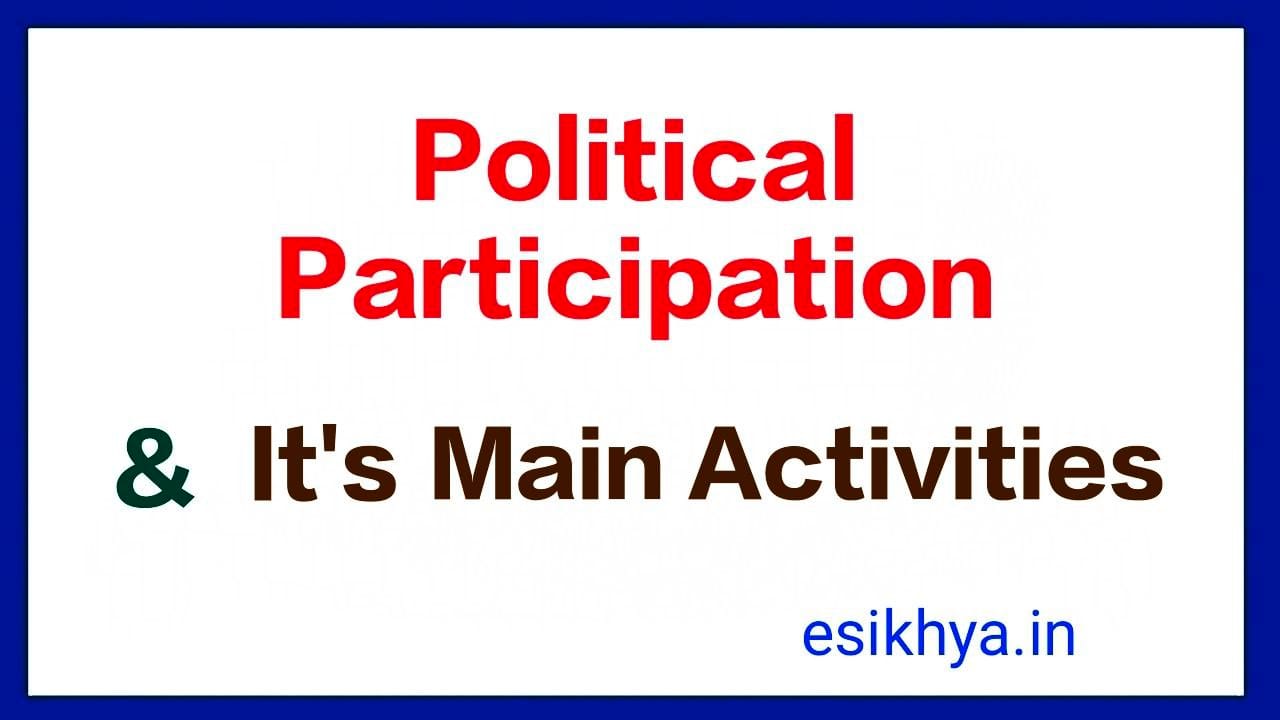
Definition of Political Participation
Political participation refers to the activities through which individuals, groups, and citizens engage in the political process and influence government decisions and policies. It is a way for people to express their preferences, exert influence over political outcomes, and hold government officials accountable. Political participation can take many forms, from voting in elections to more direct actions such as protests, petitions, or joining political parties and interest groups.
Political participation is considered a crucial component of a healthy democracy, as it allows citizens to contribute to decision-making processes, ensures government responsiveness, and promotes legitimacy and accountability in governance.
Main Activities of Political Participation
- Voting in Elections
- Voting is the most common and fundamental form of political participation in democracies. Citizens participate in elections to choose their representatives, influence government policy, and hold public officials accountable. Voting can take place in local, regional, or national elections.
- Example: Citizens voting in a general election to choose a president or members of parliament.
- Running for Political Office
- Citizens can also participate by running for political office themselves. This involves campaigning for a position in government, whether at the local, regional, or national level. By running for office, individuals seek to represent the interests of their constituents and influence policy directly.
- Example: A citizen running for mayor or for a seat in the national legislature.
- Joining Political Parties
- People can participate politically by joining political parties. Through party membership, individuals can take part in shaping party platforms, participating in party activities, and supporting candidates during elections.
- Example: A person joining a political party to attend meetings, vote in party primaries, or help campaign for party candidates.
- Engaging in Political Campaigns
- Citizens often engage in political campaigns by volunteering for or contributing financially to candidates or political parties. This form of participation helps mobilize voters, shape public opinion, and advocate for particular policies or candidates.
- Example: Volunteering to distribute flyers, make phone calls, or canvass neighborhoods for a political candidate.
- Attending Political Meetings or Rallies
- Attending political meetings, rallies, or town hall meetings is another way individuals can participate. These gatherings offer citizens the opportunity to listen to and interact with political leaders, express their concerns, and demonstrate support for specific causes or candidates.
- Example: Attending a town hall meeting where citizens can ask questions directly to their elected officials or candidates.
- Protesting and Demonstrations
- Protests, demonstrations, and marches are forms of political participation where people express their opinions, usually in opposition to government policies or in support of specific causes. These activities can be powerful tools for raising awareness and putting pressure on political leaders to act.
- Example: A protest march against climate change policies or for civil rights reforms.
- Petitions and Advocacy
- Petitions are a way for citizens to voice their concerns by gathering signatures in support of specific demands or changes in policy. Advocacy groups may also organize petitions or lobbying efforts to influence legislation.
- Example: An online petition advocating for environmental protection laws, which is then presented to government officials.
- Participating in Civil Society Organizations
- Many people engage politically by joining civil society organizations, such as non-governmental organizations (NGOs), advocacy groups, or community organizations. These groups work on specific issues like human rights, the environment, or public health, and often lobby the government or engage in public campaigns to influence policy.
- Example: A person joining a human rights organization to advocate for social justice reforms.
- Lobbying
- Lobbying involves directly contacting and influencing government officials to support specific policies or legislation. While lobbying is often associated with professional organizations, ordinary citizens and interest groups can also engage in lobbying by meeting with elected officials or writing letters to advocate for particular issues.
- Example: An environmental group lobbying lawmakers to pass stronger regulations on carbon emissions.
- Civil Disobedience
- Civil disobedience is a form of political participation that involves the intentional breaking of laws or regulations to protest unjust policies or government actions. While it is a more extreme form of participation, civil disobedience has played a significant role in political movements throughout history.
- Example: Civil rights activists engaging in sit-ins at segregated lunch counters during the U.S. civil rights movement.
- Participating in Online Activism
- In the digital age, online activism or “clicktivism” has become a growing form of political participation. It involves the use of social media, websites, and other online platforms to raise awareness, organize campaigns, and advocate for political change.
- Example: Sharing information about political causes on social media, organizing online petitions, or using hashtags to mobilize supporters.
- Jury Duty and Serving in Civic Roles
- In some countries, citizens participate politically by serving on jury duty or participating in other civic roles, such as serving on community boards or commissions. These roles give citizens a direct hand in the administration of justice and public policy.
- Example: Being called to serve on a jury for a court case or serving on a local school board.
Conclusion
Political participation is essential for the functioning of any democracy, as it allows citizens to engage with and influence the political process. From voting and running for office to protesting and participating in civil society, these activities ensure that the government remains accountable and responsive to the will of the people. By engaging in a wide range of political activities, individuals help shape the policies and decisions that affect their lives and communities. The diversity of participation methods also allows for different levels of involvement, ensuring that citizens can contribute in ways that match their interests, abilities, and access to resources.

